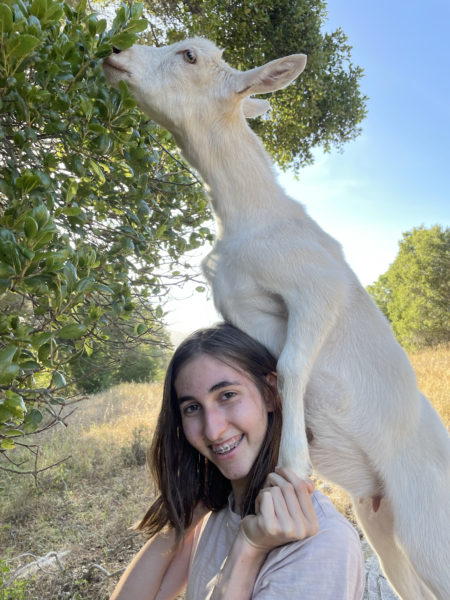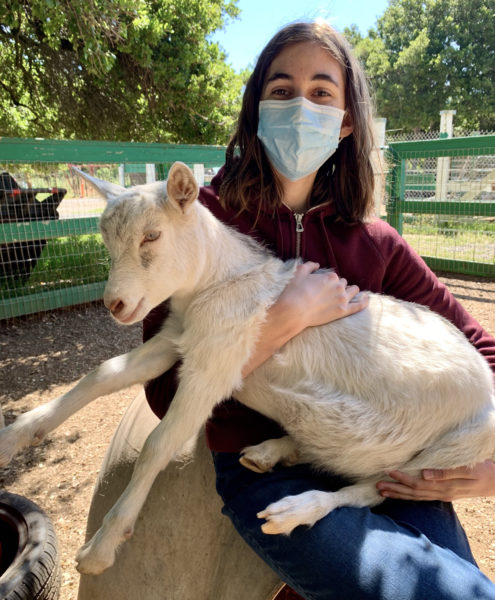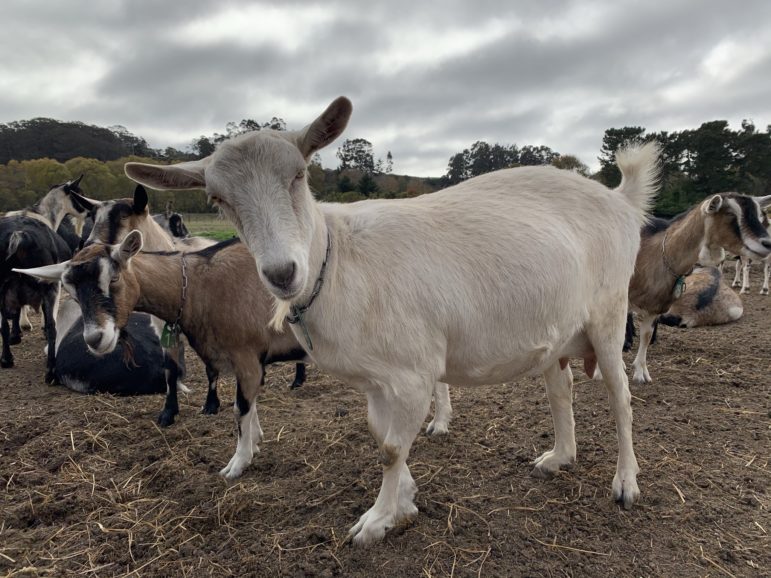


In sixth grade, junior Zoe Neil attended an educational farming camp where the resident goats captured their attention. Neil’s interest would have likely ended after the camp, though, had they not coincidentally spotted a magazine entitled “A Guide to Raising Your Own Goats” at a grocery store on the way home.
“I begged my mom for that magazine,” Neil said. “I was like, ‘Mom, I need this magazine. I just learned about goats. I need to get it.’”
Neil did, and it cemented their desire to join the small but devoted community of Bay Area youth farmers and take care of their own goats, a life-changing responsibility for them.
“You now have an organism that is reliant on you for their life and their safety,” Neil said. “There’s a selflessness that comes with that … recognition [that] you have to go [take care of it], because otherwise, your goat’s gonna die. You can’t just … take a day off.”
As the first person in their family to explore farming, Neil turned to their local 4-H club, a national youth organization, to find the resources and structure they would need to pursue this interest. As Neil gained access to more information, their connection to goats grew.
“[Goats are] really intelligent, [and] they’ll also work with you,” Neil said. “You can use them for meat, milk and fiber so they’re the most versatile out of any … farm animals that I know of.”
Over the years, Neil has raised two goats at the Crystal Springs 4-H farm. Taking care of the animals is not a small time commitment, as it involves spending roughly 15 hours a week at the farm. Because of this, Neil chose not to raise a goat this year, as their school workload increased. Those raising animals are required to go to the farm at least once a day in order to provide proper care.
“You feed them, you take them on a walk, brush them,” Neil said. “Anything else in particular that day you might need to do [like] giving them a bath and then [putting] them inside their pen [is important].”
Additionally, there are specific duties that depend on what day it is.
“Somebody feeds all the animals before school,” Neil said. “You’d have one day out of the week getting up at 5 [a.m.] to go do that.”
There is also work to be done in the afternoons.
“Once a week, you also have to clean out the pen, which is three hours of work,” Neil said. “You have to knock out the entire stall … and you put wood shavings and bedding [down].”
The experience has helped Neil develop useful skills and has made farming a permanent fixture in their life.
“I … love to do so many different things that I think my interests continually ping around,” Neil said. “But once I found goats, I was absolutely sure that I wanted to start a goat farm and whatever job or other thing I do in the future is going to revolve around that.”
Most members raising goats work with “market goats,” or goats meant to be slaughtered, but Neil chose to take a different path, seeking out a dairy goat instead. This created a slight divide in terms of the varying methodologies adopted by the respective members in terms of raising the animals.
“People will give the [market goats] medicated feed,” Neil said. “Which … means there’s antibiotics in the feed and so that is used as the preventative so animals don’t get sick, which sounds great, but it’s pretty much an over-medication.”
Neil takes a different approach instead.
“In my practice of farming, I want to get [the goat’s] life as close to what it would have been if they hadn’t been domesticated,” Neil said.
Neil holds no illusions about the reality of the animal farming industry.
“If you want to be a farmer, you … have to accept that there is going to be some animal suffering involved and that animals probably will die and can get injured and … get sick,” Neil said. “But I also don’t think that means we can’t treat them with respect and responsibility.”
Neil has found their 4-H club to be a welcoming and tight-knit community that has given them life-changing opportunities, such as getting involved with the animals and even being the goat team leader, a role which provided teaching and leadership experiences. Neil encourages anyone with an interest in animal farming to consider checking out the club.
“With spring coming up, this is … the best time to join because you get to … experience and interact with all of the animals,” Neil said
Neil aspires to one day own their own farm in which they would provide other youths interested in animal farming with similar educational opportunities to those which inspired them. Neil’s desire to create this comes from their love of teaching and sharing their passions with others.
“Always be willing to try new stuff you never thought you would like,” Neil said. “Having [farming] in my life gives my life so much purpose and so much direction and I really want everyone else to be able to have that too.”



